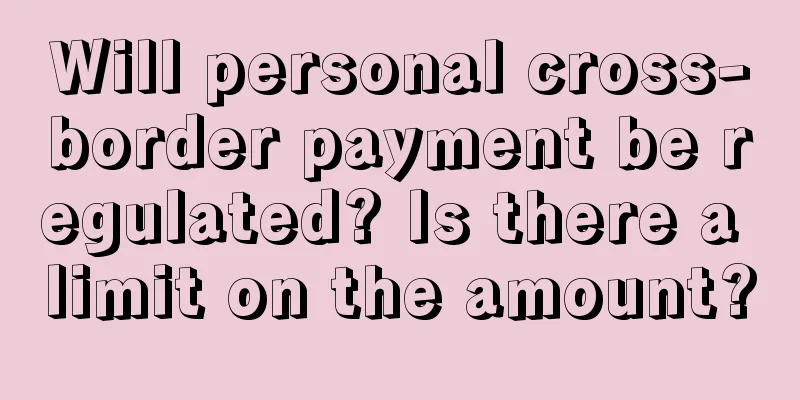Will personal cross-border payment be regulated? Is there a limit on the amount?

|
For merchants doing cross-border e-commerce, the most common payment methods are PayPal, credit cards and Western Union. In addition, there are wire transfers and letters of credit. Some merchants asked, will personal cross-border payment be regulated? meeting 1. Is there any limit on the amount of cross-border payments for individuals? 1. The annual upper limit for foreign exchange purchases by domestic individuals with their ID cards is US$50,000, and the upper limit for remittances abroad is US$50,000 per day; 2. The purpose of remittance written by the remitter when making the remittance must not be fictitious and must be accurate; 3. The payee cannot be a financial company, such as an investment company, securities company, gold exchange, futures exchange, insurance company, etc.; 4. The remitter and address filled in when remitting money abroad must be detailed and accurate. 2. What are the ways for individuals to receive cross-border payments? 1. PayPal payment PayPal is currently the world's largest online payment company. It has more than 190 million active users in 203 countries and regions around the world. Cross-border transactions account for 21% of the total transaction volume, allowing funds to be transferred between users who use email to identify themselves. 2. Western Union Receipt Main usage scenarios: offline payment collection, suitable for small amount of foreign exchange collection Advantages: Zero risk, zero handling fee. Directly transfer money to the provided Western Union account, and the handling fee is borne by the buyer. Zero risk for the seller, first collect the payment and then ship. And the payment will be received immediately after the customer pays, and the timeliness is very fast. Disadvantages: It is troublesome for customers to pay, and the handling fee is high. Customers need to go to the bank to queue up, and they have sent pictures of the number in the bank several times; the bank cards for receiving remittance are limited. I have tried Postal Savings Bank, Bank of China, and Everbright Bank, and they can all receive remittance through Western Union. 3. Hong Kong offshore company bank account Advantages: There is no limit on the amount of wire transfers received, and there is no limit on the annual personal foreign exchange settlement limit of US$50,000. Suitable for receiving large remittances. Disadvantages: The threshold for opening bank accounts for offshore companies in Hong Kong is getting higher and higher. Since 2017, HSBC, as a leading bank in Hong Kong, has actively responded to the CRS tax exchange policy, opening the prelude to anti-money laundering and capital outflow policies. Banks have also tightened their account opening policies, shutting out many small and medium-sized enterprises. In summary, personal cross-border payment will be regulated. For example, if the account funds suddenly exceed 500,000, or the funds inflow and outflow in one day exceed 500,000, the bank will ask you to provide proof of the legality of the source of funds. |
<<: What are the eight common foreign trade payment methods?
Recommend
Children's Day Marketing: How Brands Can Make Money by Being Cute
The article comprehensively explains the reasons, ...
Being a clone in TikTok is where AI cannot surpass humans
In the TikTok, copying people and starting imitati...
Can Amazon's 7-day promotional prices be adjusted at will? How to set the price?
After opening a store on Amazon, everyone will try...
With over 20 million members and an annual GMV exceeding RMB 4 billion, how does Guoquan Food manage to dominate the private catering industry?
Pre-prepared meals are common to everyone. This in...
How is it to open a store on eBay now? What are the prospects?
When it comes to eBay, many people's impressio...
Simba becomes a super anchor again, all thanks to Kuaishou?
While Simba was busy competing with Xiao Yangge, D...
A complete list of Shopee’s automatic replies. Which is the best way to reply?
Some of the merchants who open stores on Shopee ar...
What are the consequences of cross-border e-commerce infringement? How to avoid infringement?
With the advancement of globalization and the rapi...
Introduction to Shopee Taiwan's December Marketing Activities
Registration is now open for Shopee Taiwan’s Decem...
Can the link of Amazon's follow-up sale be cancelled? What is Amazon's follow-up sale?
With the continuous growth of the Amazon platform,...
Super anchors go overseas, ice and fire
This article introduces the trends and challenges ...
How to open a store on Shopee without a source of goods? What is the entry process?
Now many friends are engaged in cross-border e-com...
Don't always look at things from your own perspective
As marketers, our most important ability is to thi...
I booked photos on Xiaohongshu and earned 15,000 yuan a month
With the development of the Internet, people are g...
How long is the time limit for enterprises to settle foreign exchange? What should I do if it is restricted?
With the deepening development of the global econo...









